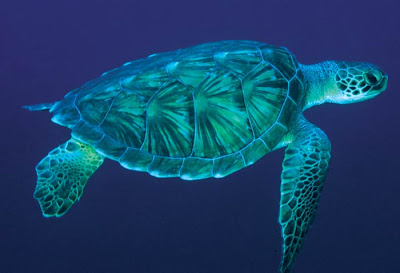Sea turtles have their habitats in all the world's oceans except the Arctic ocean. At this moment there are seven species of sea turtles in the world. Sadly, six species are being listed as endangered species. Sea turtles have been on Earth since Mesozoic but because of us humans they are brought at the brink of extinction.
Sea turtles are not only amazingly beautiful, they are also very advanced creatures with extraordinary sense for time and location and they use Earth's magnetic field as their navigational system. It takes them 30 years to mature, and this is the only time when adult female sea turtles return to the land to nest. Depending on turtle species, female sea turtle can nest between 150-200 eggs with incubation lasting about two months. Only about 0,01 % of this eggs have an actual chance to become a grown turtle one day because of many predators that lurk around.
Sea turtles are hunted almost everywhere on the world map, despite the fact that their hunting is illegal in many countries. More often than not they become food in fancy restaurants around the world. Even in ancient times sea turtles were famous as exotic delicacies (China). Meat is not the only reason for their excessive hunting, their shells for instance are traditional decorative ornamental material often used in Japan and China.
What people fail to see is the significance of these lovely creatures in ecosystems, not only in oceans but also on the beaches. If these wonderful creatures were to become extinct it could cause tremendous negative impact on ecosystems in oceans and on the beaches. Two species are already critically endangered - Kemp's Ridley and Hawksbill turtles, and two other species Olive Ridley, and Green turtles aren't very far from being listed as critically endangered.
Their importance is just as vital in oceans as it is on beaches. Turtles eat sea grass in ocean, and sea grass must be kept short to remain healthy; beds of healthy sea grass are essential breeding and development areas for many species of fish and other marine life, and in beaches they contribute nutrients to beach (as well as dune, which is similar) vegetation from their eggs.
Many countries have realized the significance of these wonderful creatures and are already working on laws and legislation that would mean their survival. Sea turtle conservation started in 1970's and 1980's but with no significant success because many turtles still end up in turtle soups and some other delicacies. That's not all, in Nicaragua turtle hunting has even become a way of living.
In order to help these creatures scientists studied their migration, nesting habits, hatching habits and mating habits to help us learn more about them so we could save them from extinction. But will that be enough? Only time will tell, but current situation doesn't give us much hope.

No comments:
Post a Comment